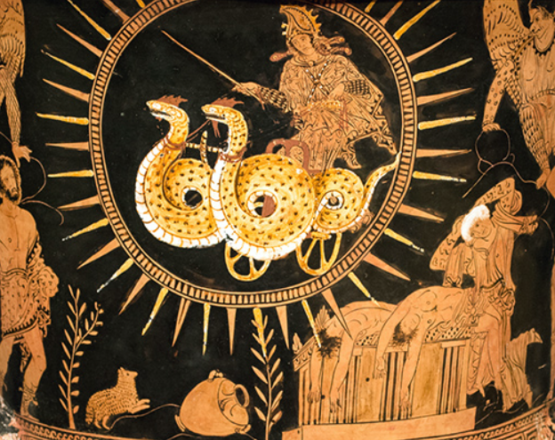Greek language

Only in the Greek language do we find the signifier (i.e. the word) and the signified (i.e. the meaning of the word).
In Greek these two have a primary relationship, since unlike other languages the signifier is not a random series of letters.
In an ordinary language like English we can all agree to say cloud and car, once we agree that it should be both.This is inter subjective In Greek this is impossible. This is why many people separate Greek as a “conceptual” language from other “semantic” languages.
In fact, the great philosopher and mathematician Wenner Heisenberg had noted this important quality about which he said “My service in ancient Greek has been my greatest intellectual exercise. In this language there is the fullest correspondence between the word and its conceptual content.” As Antisthenes used to tell us, “The beginning of wisdom is the visitation of names”. For example, an “archon” is one who has his own land (so = land + hakon). And indeed, even in our day it is very important to have one’s own land/house.
The “helper” means the one who at the call runs. Boe = voice + θέω = run. Astir is the star, but the word itself tells us that it moves, it does not stand still in the sky (a + stair from water which means to stand). What is really interesting is that many times the word describes properties of the concept it expresses, but in such a way that it impresses and gives food for thought. For example, “envy” is derived from the verb “φθίνω” which means to decrease, to shrink. And indeed envy as an emotion is slowly diminishing and destroying us.
It “diminishes” us – it diminishes us as human beings – and it diminishes us as well as our health. And of course when we want to characterize something that is so much so that it doesn’t end, what do we call it? But of course “abundant”. We have the word “fine” which comes from “hour”.
Because for something to be good, it has to be on time. A beautiful fruit is neither unripe nor rotten, and a beautiful woman is not a woman at 70, but not at 10 either. We still have the word “freedom” for which the “Etymologically to go where you love Statue is etymologically derived from agallomai (delight) because when we see a beautiful ancient Greek statue our soul rejoices. And from this sight comes exultation. But if we do the analysis of this word we will see that it is a compound of agallomai + ίαση healing).
At this point, we can only dwell on the corresponding Latin word for statue The Latins named the statue, statua from the Greek still already mentioned as a word, and they called it so because it stands still. Here we see the huge difference in philosophy between the two languages, what means something so deep conceptually in Greek, to the Latins is just a still thing. Also another comparison. “Man in Greek is also etymologized as the being that looks upwards (upper + throsko).
What an important and fascinating etymology that can be the basis for endless philosophical discussions. In contrast, in Latin man is “Homo” which is etymologically derived from the soil. So the being that looks up to the sky for the Greeks, just soil earth – for the Latins..


